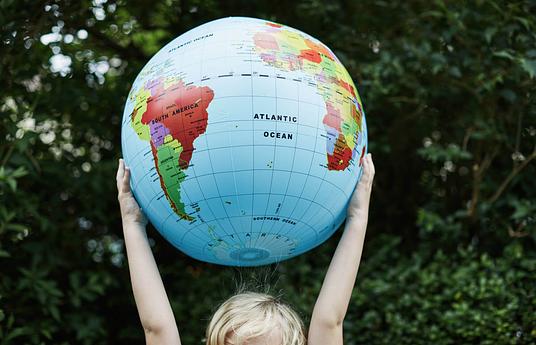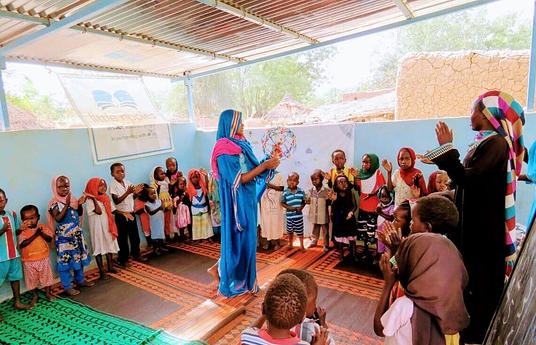This is the first time, in a very long time, that the entire world is suffering from the same challenges, obstacles, and opportunities. The novel Coronavirus has restricted not only movement and education but has impacted the personal and professional lives of nearly the entire human population.
We have spent the past few months discussing, almost exclusively, the massive impact of the COVID-19 pandemic on education. In that time one question we heard, time and time again, was how do we support children without access to internet connectivity or conducive learning environments at home?
In times like these, some people see themselves as connectors and enablers while others require much more care and support. Through this article, we hope to summarise the truth and hope we noticed amongst our innovator community, especially those who support students and families from low-income, marginalized communities around the world. A few weeks ago we hosted a webinar, the aim of which was to provide a space for our innovator community working in marginalized communities to vent, share, and inspire each other.
To open the conversation, we invited three innovators - Caitlin Baron from SpeedSchool/Luminos Fund, Ethiopia, Fakhira Najib from Broad Class - Listen to Learn, Pakistan, and Paola Franco from Coschool, Colombia to share how they have been interacting with their key beneficiaries in the current, constantly changing climate. You can find their presentations in the video below:
With 58 grassroots leaders from 28 countries, we got ourselves into small groups and explored the topic of supporting marginalized student’s learning and wellbeing. We spoke about our current realities, our biggest obstacles as well as our hopes for the future of education, our students, and our countries.
TRUTH
In many countries around the world, students in remote areas with limited access to connectivity or resources have been deeply affected by Coronavirus. In Thailand, Kenya, and India, for example, there is a clear lack of resources & support reaching these students & families. For many, the impact goes beyond learning gaps, and we start to see rising anxiety levels, pessimism, distrust, and often, trauma.
In Botswana & Pakistan, many populations are living in the margins without basic resources like food and shelter. And as a response, many educators have extended their line of duty beyond learning. Protsahan India Foundation and Project DEFY from India have been helping supply food, correct information, safety measures, and activities to stay focussed & positive, to their community members. iAct (in Chad, Tanzania, Cameroon, and Greece), BroadClass (in Pakistan) and Slam Out Loud (in India) are creating and distributing resources in multiple regional languages through their social workers as well as mediums like radio and WhatsApp to engage and support large communities of people.
Even in countries like the USA & Germany, we are seeing the impact of digital illiteracy and low connectivity which is not allowing learners and teachers to move to online schooling. As per Education Above All, a non-profit based out of Qatar, this can have huge consequences in enlarging the equity and learning gaps between students from ill-resourced countries to the rest of the world.
In more well-resourced countries like Finland, educators and grassroots leaders are exploring the best ways to provide an educational experience that makes students feel connected, part of a group, despite lack of funding and uncertainty about the future.
HOPE
Despite these challenges, we are seeing immense inspiring stories of educators and educational leaders coming together, despite geographical or mental boundaries.
There is still hope in all the chaos.
Around the world, educators are employing traditional methods of mass media like TV, radio, and newspapers to engage with students and families. Even SMS and Whatsapp services have been used to deliver lessons, arrange for ration, and manage donation drives around the world. WhatsApp groups for educators are open to all and running in English, French, Spanish, and Arabic.
Kiwix, in partnership with Orange Telecom, is providing zero-rated (free data) access to copies of Wikipedia, the Wiktionary, the Gutenberg library, or Khan Academy to 10 countries in the Middle-East and Africa (MEA) region.
In Colombia and Finland, national airline employees are volunteering to create content as well as mentor young students with their homework. Many technology companies are donating their old laptops and phones to rural areas, which are being delivered by the country’s police and army. Cities are deploying state officials and social workers to deliver mid-day meals, dry rations, and education packets in rural areas.

There is an immense power in collective action that we are seeing happen around the world. As we close this article we want to share a quote from the innovators behind BEADS for Education along with some few resources that might be of help to you:
"As you know our high school is closed. Luckily our teaching staff started online learning through cell phones! Quite a feat here since so many girls live in mud huts in very remote places such as the Maasai Mara and near Amboseli National Park. Using cell phones through an application called WhatsApp, teachers share learning materials which students access, complete the assignments, and then return to them. Students are also able to video chat, leave a phone message, and use instant messaging. For the students who do not have phones, a community member receives the document, downloads, prints, and delivers to the students - often passing giraffes, warthogs, and elephants on the way. Our girls are so excited to continue their studies and are asking for more work. One teacher said to his student, "Reach for the stars." And she replied, "The stars are only my stepping stone."
Stepping stones they are!
USEFUL RESOURCES
Reaching Children & Students in Remote Locations HundrED’s COVID page
Webinar by Jaime Saavedra, the World Bank Group’s Global Director for Education. Particularly on differences between low and high income countries
iAct Coronavirus Resource Deck (available in 10 languages: English, French, Farsi, Arabic, Swahili, Kirundi, Sorani, Kurmanji, Burmese, and Karen)
Resources for digitally-constrained homes in underserved contexts | Education Above All
Teach For All’s Top 12 Insights in Virtual Learning & Knowledge
Systems with strong offline functionality
- Kolibri – Learning application to support universal education, available in more than 20 languages.
- Rumie – Education tools and content to enable lifelong learning for underserved communities.
- Ustad Mobile – Access and share educational content offline.




